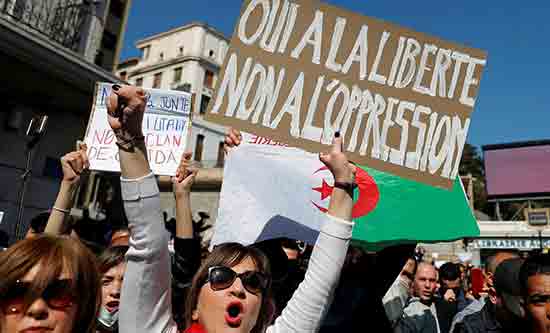
Hundreds of thousands of protesters have come out in Algeria’s cities against president Abdelaziz Bouteflika’s National Liberation Front (FLN) government. The 82-year-old Bouteflika has been in office since 1999, and the FLN has held power since its victory in the heroic anti-colonial liberation war against France in 1962. Demonstrations against Bouteflika started on 16 February and are continuing as we go to press six weeks later. They were sparked by the president’s announcement of his intention to run for a fifth term in upcoming elections. Protesters found the announcement ‘humiliating’ as Bouteflika has been ill and rarely appeared in public after a stroke in 2013. While past election results have been questionable, Bouteflika has maintained between 80% and 90% of the vote. A five-day strike, starting on 10 March, paralysed the capital and key economic sectors. Transport in the cities, oil and sugar production and higher education were stopped during the strike. Protests have been largely peaceful, with few clashes between protesters and police.
On 11 March, in response to the discontent, it was announced that Bouteflika would not stand again. On 12 March the prime minister, Ahmed Ouyahia resigned, and the April 2019 elections were postponed indefinitely. The FLN is now attempting to form a new government. The new prime minister, Noureddine Bedoui, declared that the new cabinet will include experts without political affiliation. Protests have only grown in numbers since this reshuffling.
Given the feeble state of Bouteflika, it is clear that the country’s ruling class is behind his reluctance to leave power. The government of Bouteflika has entrenched the position of the country’s bourgeoisie, which has grown rich with state contracts and the export of oil and gas to Europe. The Forum of Business Leaders (FCE) is a key supporter of Bouteflika. This is not surprising as FCE president Ali Haddad amassed his wealth through million- and billion-dollar construction deals with the government. In 2014 he admitted that he ‘is close to military and civilian officials’, such as the president’s brother and right-hand man, Said Bouteflika. A recent project puts this into perspective: a 750-mile highway cost $15bn, making it one of the most expensive road projects in the world.
Some FLN politicians and business-men have jumped ship, however. Moab Bouchareb, a leading figure in the FLN, claimed that the party ‘supports the popular movement’ – as well as Bouteflika’s unclear ‘reform plan’. There are also rumours of certain leading bourgeois figures, such as Mohamed Benamor, meeting with potential successors, in their quest for state contracts.
Other more principled former and current FLN members have come out in support of the protests. Djamila Bouhired, a popular veteran of the struggle for decolonisation and the liberation of women, has joined the movement. In contrast to the 1988 anti-government movement, Algerian women are taking an increasingly active role.
French president Emmanuel Macron praised the decision of president Bouteflika, stating that it would lead to a ‘transition of reasonable length’. These declarations resulted in protesters rejecting any kind of interference from France. For example, a large banner read ‘It’s the people who decide, not France.’ These protests contrast with trends in the ‘Arab Spring’ in some other countries which called for intervention from Europe and the US. In fact, many criticise the FLN’s links with European states and businesses.
The future remains uncertain. It is not clear whether the FLN will step down or cling to power with another figurehead. It is hard to predict who would become the next president or even the next ruling party. The protests are not led by any particular organisation. Trade unions, former FLN members, the Workers’ Party and the Islamic High Council (a union of imams) are amongst the many groups involved.
The FLN was initially a popular movement which gained its legitimacy in the long and bloody war of independence (1954-1962) in which it defeated French colonialism. At least one million Algerians died. Despite many conflicting trends within the FLN, and the suppression of communists and other opposition, the government initially took many popular and progressive steps towards creating an independent, anti-imperialist Algeria. The government began to turn away from socialist policies in the 1980s, and discontent grew alongside the rise of Islamist parties. Multi-party elections were introduced in 1988. In 1991, as the Islamic Salvation Front (FIS) was poised to win the elections, the pro-FLN military staged a coup d’état, resulting in the Algerian Civil War (1991-2002). In the 2004 elections Bouteflika was seen as a national unity figure, supported by members of the FIS, the FLN and other factions.
In Algeria’s recent history there have been few signs of widespread popular discontent. The current protests are the largest since 2001. The ‘Arab Spring’ was negligible in Algeria, and the country had not experienced neoliberal shock to the same degree as Tunisia or Egypt. Income from natural gas and oil have sustained high levels of development and demobilised discontent. Algeria has the highest Human Development Index in Africa. However, recent years have seen Algerians’ living standards deteriorate with a drop in oil and gas income. Greater than 10% unemployment has been a chronic feature of post-civil-war Algeria. The country’s youth sees little future within the current situation and demands change – it remains to be seen in what direction.
Elias Haddad
Fight Racism! Fight Imperialism! 269 April/May 2019




